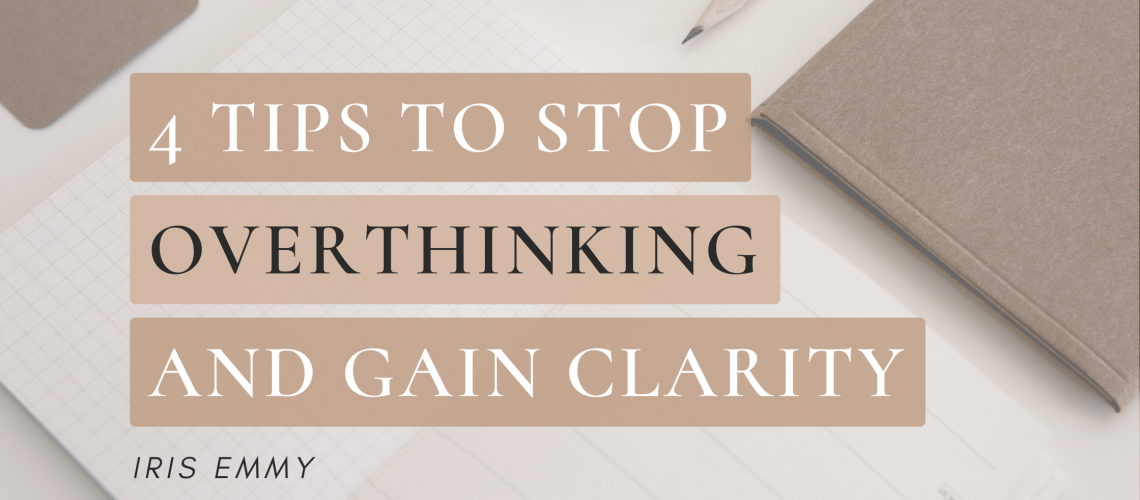
Analysis paralysis. It’s been the cause of procrastination, as well as forgetting things and beating myself up for it. My brain is always full of stuff and never seems to catch a break. Ever.
However, over the last few yeas, I have gotten a lot better at clearing my mind when I start overthinking. Especially when overthinking leads me to lose track, lose focus, procrastinate and forget things.
Here are a few things I do regularly that help me get out of the overthinking cycle and focus on productive action. Like I said in some of my TikTok videos, the way to break through overthinking is with productive, positive action. Three of these tips are things that help me take action and one other tip is to give your mind a break regularly (which is tip 3 if you want to jump ahead).
So, here they are: four of my favourite ways to decrease overthinking and increase clarity.
Get all of your ideas on an empty sheet of paper! Pick 3 of your ideas of this list that you’ll focus on right now, and set all of the other things aside for now. If you want, you can add a manifestation element by doing the following:
The point of this is for you to start focusing on only a few things, and leave all your other plans (unless absolutely necessary) alone for now. It helps to get things out of your head and focus on what gives you excitement and purpose. Make sure that when you pick 3 items, you pick the ones you feel drawn to the most right now. In other words: listen to your intuition! How? Your eyes may be drawn to certain ideas on the list, maybe you’re already certain about one or perhaps you feel it more as an expansive or excited feeling in your belly. Whatever the case is, pick three, put them in your agenda and leave the other ideas alone for now.
Another way to ‘declutter’ your mind is by setting alarms and timers to have specific times to do something. The purpose of this is to stop thinking of what you have to do later. You don’t want to go about your day worrying you might forget to do something. So, get it out of your mind by writing things down and setting reminders.
It helps to set alarms for things you have on your to do list that you really don’t want to forget about. However, the point of the alarm is not just to function as a reminder, but to serve as a trigger to actually do it as soon as the alarm goes of. This is especially helpful for things you have a tendency to procrastinate on.
Another tip is to set timeblocks in your agenda for specific purposes. Promise yourself to do just one thing during that time and set everything else aside. You can do that for work-stuff, but also personal stuff! It can be helpful to block time in for fun, self-care etc.
The best thing to do is to spend an hour in the morning and an hour before bed doing this. As I was channeling this one, I was told that reading is a very beneficial thing to do instead of watching Netflix or scrolling through social media. It doesn’t matter what you read, as long as it doesn’t take too much thinking and focus. However, spend this time however you like! The tip is to spend this time decreasing the amount of stimulation, and focus on one thing. Ask yourself; how do you like to take your mind of things? Some suggestions are like I said reading, but also meditating, writing, walking, gardening, etc. Doing something slow, peaceful and not intensive is the point here.
This is a tip I could have added to the 2nd one, but I think it’s worth mentioning separately.
Dedicating a specific amount of time to THINK can be a very productive thing to do. Rather than trying to make a choice or come up with ideas while doing other things.
However, there comes a time where you just have to choose something. Especially if you’re as indecisive as I am, it can be helpful to give yourself a deadline or time slot before which you have to make a choice.
Researching and analysing is great, but when you are overthinking it may no longer be productive analysing at some point. If analysing leads to productive new action and change: it’s helpful and necessary. But if you’re analysing to the point of procrastination, then it’s no longer serving you. To break through over-analysing, give yourself a time boundary and stick with it.
After the time is up write down:
Break them down into small actionable steps!
For example: the choice you made is to go on holiday to Barcelona, Spain and the action steps you wrote down are: 1: book a hotel, 2: book a flight ticket and 3: pick a few must-see spots to go to.
However, there are a lot of smaller steps that go into actually booking a hotel for example. This can look like: setting a budget, choosing an area in the city to book a hotel, then looking at the best options, etc.
In other words, one action step may contain many smaller steps! And to avoid getting overwhelmed, make your plans specific and small. The more vague you leave your plans/action steps, the more room you give yourself to overthink and/or get overwhelmed.
Therefore, look at your action steps, break them down into smaller steps and put those in your agenda!